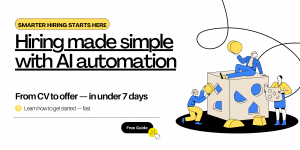Did you know that effective candidate screening is the cornerstone of successful recruitment processes? In today’s competitive job market, identifying top talent amidst a sea of applicants is no easy feat. From navigating biases to managing high volumes of candidates, mastering the art of screening is essential for finding the perfect fit for your team. Join us as we delve into the strategies, best practices, and innovative approaches that can revolutionize your candidate screening process and elevate your recruitment outcomes.
Understanding the importance of candidate screening
Definition of Candidate Screening
Candidate screening is a crucial part of the recruitment process where potential candidates are assessed based on their qualifications, skills, and fit for the job role. It involves various methods to evaluate candidates and determine their suitability for the position.
Significance of Candidate Screening
Effective candidate screening not only saves time and resources for the hiring team but also ensures that only the most qualified candidates proceed further in the recruitment process. By screening candidates thoroughly, organizations can identify top talent and make informed hiring decisions.
Statistics on the Impact of Effective Candidate Screening
According to a study by SHRM, 75% of hiring managers have caught a lie on a resume through effective screening processes. Additionally, companies that implement robust candidate screening techniques experience a 33% decrease in employee turnover rates.
Key Elements of an Effective Candidate Screening Process
Identifying Job Requirements and Qualifications
Clearly defining the job role, including key responsibilities and skills required.
Developing criteria for screening candidates based on must-have qualifications and nice-to-have skills.
Aligning screening methods with the specific requirements of the role, such as technical assessments or behavioral interviews.
Implementing Screening Criteria and Methods
Setting clear benchmarks for evaluating candidates against the established criteria.
Using screening tools like pre-employment assessments or personality tests to gather additional insights.
Establishing consistent evaluation processes to ensure fair and unbiased candidate assessments.
Utilizing Technology for Efficient Screening
Leveraging applicant tracking systems (ATS) to streamline the screening process and manage candidate data effectively.
Implementing AI-powered tools for resume parsing and keyword matching to identify top candidates quickly.
Integrating video interviewing platforms for remote screening and efficient candidate evaluation.
For more insights on optimizing your candidate screening process, check out how industry leaders like Google and Amazon leverage advanced technologies for talent acquisition.
Best Practices for Streamlining Candidate Screening
Automating Initial Candidate Assessments
Automation plays a crucial role in streamlining the candidate screening process. By leveraging automated tools, recruiters can:
Implement online application forms with pre-screening questions to filter out unqualified candidates.
Use chatbots for initial candidate interactions to gather basic information and assess candidate fit.
Utilize email automation for sending assessment tests or further screening requirements to candidates.
Using AI Tools for Resume Screening
AI technology has revolutionized resume screening by:
Analyzing resumes and cover letters to identify key skills and qualifications.
Matching candidate profiles with job descriptions to shortlist suitable candidates.
Providing data-driven insights to recruiters on candidate relevancy and potential fit for the role.
Conducting Structured Interviews for Deeper Evaluation
Structured interviews offer a systematic approach to candidate assessment by:
Developing standardized interview questions based on job requirements.
Evaluating candidates consistently across interviews to ensure fair comparisons.
Rating candidate responses against predetermined criteria to make informed hiring decisions.
To explore cutting-edge technologies in candidate screening, learn how leading companies like Microsoft and IBM integrate AI and automation for efficient talent acquisition strategies.
Overcoming Common Challenges in Candidate Screening
Addressing Bias in the Screening Process
Bias in candidate screening can lead to discriminatory practices and hinder diversity and inclusion efforts. Ways to address bias include:
Implementing structured interview processes to focus on job-related criteria rather than personal attributes.
Using blind recruitment techniques such as anonymized resumes to reduce unconscious bias.
Providing diversity and inclusion training for recruiters and hiring managers to increase awareness and promote fair assessment.
Managing High Volumes of Applicants
Dealing with a large pool of candidates can be overwhelming, but strategies to manage this include:
Setting clear screening criteria upfront to efficiently filter out unqualified applicants.
Utilizing ATS features like keyword search and filters to categorize and prioritize candidates.
Establishing communication protocols to keep candidates informed about their application status and next steps.
Ensuring a Positive Candidate Experience Throughout the Screening Process
A positive candidate experience is essential for employer branding and attracting top talent. Factors to focus on include:
Providing timely feedback to candidates at each stage of the screening process.
Offering a user-friendly application process and clear instructions for assessments.
Personalizing communication with candidates to make them feel valued and engaged.
To see how industry leaders like Apple and Facebook tackle these challenges in candidate screening, explore their innovative recruitment strategies.

Tips for Enhancing Your Candidate Screening Process
Utilize Behavioral Assessments for Deeper Insights
Incorporating behavioral assessments in your candidate screening can provide valuable insights into a candidate’s work style and tendencies. Consider:
Using tools like DISC assessments to understand communication preferences and team dynamics.
Implementing situational judgment tests to assess problem-solving skills and decision-making capabilities.
Analyzing behavioral assessment results in conjunction with other screening methods for a holistic candidate evaluation.
Implement Skills-Based Testing for Technical Roles
When hiring for technical positions, skills-based testing is a crucial component of candidate screening. Ways to effectively incorporate this into your process include:
Designing coding challenges or technical assessments tailored to the specific job requirements.
Using platforms like HackerRank or Codility to automate and streamline the skills evaluation process.
Collaborating with technical experts within your organization to create realistic and relevant assessment tasks.
Offer Feedback and Support to Candidates
Providing constructive feedback to candidates, especially those who have been screened out, can enhance their experience with your organization. Here’s how you can do this effectively:
Offer feedback on areas for improvement or why they may not have progressed to the next stage.
Provide resources or recommendations for skill development based on their assessment results.
Maintain open communication channels for candidates to seek clarification or additional support post-screening.
To discover how companies like Netflix and LinkedIn incorporate these strategies into their candidate screening processes, explore their talent acquisition approaches.
FAQ
How important is candidate screening in the hiring process?
Candidate screening is crucial as it helps organizations identify the most qualified candidates for a job, saving time and resources while ensuring a successful match between the candidate and the role.
What are some common challenges faced during candidate screening?
Challenges like bias in the screening process, managing a high volume of applicants, and maintaining a positive candidate experience are commonly encountered by recruiters during candidate screening.
How can technology enhance the candidate screening process?
Technology such as AI-powered tools and applicant tracking systems can streamline candidate screening by automating initial assessments, conducting resume screenings, and facilitating efficient communication with candidates.
What role do behavioral assessments play in candidate screening?
Behavioral assessments provide insights into a candidate’s work style and tendencies, helping recruiters assess compatibility with the job role and existing team dynamics for a more holistic evaluation.
How can organizations provide a positive candidate experience during the screening process?
Organizations can enhance the candidate experience by offering timely feedback, ensuring a user-friendly application process, and personalizing communication to make candidates feel valued and engaged throughout the screening process.
-

A passionate advocate for the future of HR innovation. With expertise in leveraging AI to revolutionize recruitment processes, Carlos has a clear vision: empower HR teams while creating meaningful candidate experiences.
View all posts





